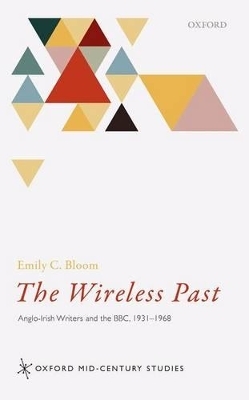
The Wireless Past
Anglo-Irish Writers and the BBC, 1931-1968
Seiten
2016
Oxford University Press (Verlag)
978-0-19-874961-5 (ISBN)
Oxford University Press (Verlag)
978-0-19-874961-5 (ISBN)
Emily Bloom chronicles the emergence of the British Broadcasting Corporation as a significant promotional platform and aesthetic influence for Irish modernism from the 1930s to the 1960s. She situates the works of W.B. Yeats, Elizabeth Bowen, Louis MacNeice, and Samuel Beckett in the context of the media environments that shaped their works.
The Oxford Mid-Century Studies series publishes monographs in several disciplinary and creative areas in order to create a thick description of culture in the thirty-year period around the Second World War. With a focus on the 1930s through the 1960s, the series concentrates on fiction, poetry, film, photography, theatre, as well as art, architecture, design, and other media. The mid-century is an age of shifting groups and movements, from existentialism through abstract expressionism to confessional, serial, electronic, and pop art styles. The series charts such intellectual movements, even as it aids and abets the very best scholarly thinking about the power of art in a world under new techno-political compulsions, whether nuclear-apocalyptic, Cold War-propagandized, transnational, neo-imperial, super-powered, or postcolonial.
The Wireless Past chronicles the emergence of the British Broadcasting Corporation (BBC) as a significant promotional platform and aesthetic influence for Irish modernism from the 1930s to the 1960s. This is the first book-length study of Irish literary broadcasting on the BBC and situates the works of W. B. Yeats, Elizabeth Bowen, Louis MacNeice, and Samuel Beckett in the context of the media environments that shaped their works. Drawing upon unpublished radio archives, this book shows that radio broadcasting, rather than prompting a break with literary history and traditional literary forms, in fact served as an important means for reinterpreting the legacies of oral and print traditions. In the years surrounding World War II, radio came to be seen as a catalyst for literary revivals and, simultaneously, a force for experimentation. This double valence of radio--the conjoining of revivalism and experimentation--create a distinctive radiogenic aesthetics in mid-century modernism.
The Oxford Mid-Century Studies series publishes monographs in several disciplinary and creative areas in order to create a thick description of culture in the thirty-year period around the Second World War. With a focus on the 1930s through the 1960s, the series concentrates on fiction, poetry, film, photography, theatre, as well as art, architecture, design, and other media. The mid-century is an age of shifting groups and movements, from existentialism through abstract expressionism to confessional, serial, electronic, and pop art styles. The series charts such intellectual movements, even as it aids and abets the very best scholarly thinking about the power of art in a world under new techno-political compulsions, whether nuclear-apocalyptic, Cold War-propagandized, transnational, neo-imperial, super-powered, or postcolonial.
The Wireless Past chronicles the emergence of the British Broadcasting Corporation (BBC) as a significant promotional platform and aesthetic influence for Irish modernism from the 1930s to the 1960s. This is the first book-length study of Irish literary broadcasting on the BBC and situates the works of W. B. Yeats, Elizabeth Bowen, Louis MacNeice, and Samuel Beckett in the context of the media environments that shaped their works. Drawing upon unpublished radio archives, this book shows that radio broadcasting, rather than prompting a break with literary history and traditional literary forms, in fact served as an important means for reinterpreting the legacies of oral and print traditions. In the years surrounding World War II, radio came to be seen as a catalyst for literary revivals and, simultaneously, a force for experimentation. This double valence of radio--the conjoining of revivalism and experimentation--create a distinctive radiogenic aesthetics in mid-century modernism.
Emily C. Bloom is a Visiting Assistant Professor at Columbia University specializing in modern British and Irish literature. She received her PhD from the University of Texas at Austin and has served as Assistant Professor at Georgia State University and Visiting Professor at the United States Air Force Academy.
Introduction: Air-Borne Bards 1
1: W. B. Yeats's Radiogenic Poetry
2: Louis MacNeice in the Echo Chamber
3: Elizabeth Bowen's Spectral Radio
4: Samuel Beckett's Sound Archives
Conclusion: Legacies of Radiogenic Aesthetics
| Erscheinungsdatum | 11.11.2016 |
|---|---|
| Reihe/Serie | Oxford Mid-Century Studies |
| Verlagsort | Oxford |
| Sprache | englisch |
| Maße | 148 x 222 mm |
| Gewicht | 382 g |
| Themenwelt | Kunst / Musik / Theater ► Film / TV |
| Geisteswissenschaften ► Sprach- / Literaturwissenschaft ► Anglistik / Amerikanistik | |
| Geisteswissenschaften ► Sprach- / Literaturwissenschaft ► Literaturwissenschaft | |
| ISBN-10 | 0-19-874961-9 / 0198749619 |
| ISBN-13 | 978-0-19-874961-5 / 9780198749615 |
| Zustand | Neuware |
| Haben Sie eine Frage zum Produkt? |
Mehr entdecken
aus dem Bereich
aus dem Bereich
Poetik eines sozialen Urteils
Buch | Hardcover (2023)
De Gruyter (Verlag)
59,95 €
Buch | Softcover (2024)
belleville (Verlag)
20,00 €


